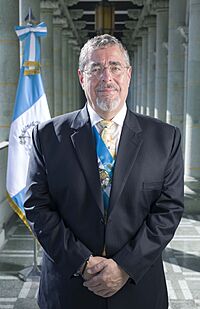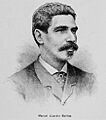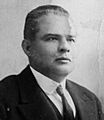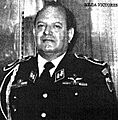President of Guatemala facts for kids
Quick facts for kids President of theRepublic of Guatemala |
|
|---|---|

Presidential flag
|
|

|
|
| Office of the President of Guatemala National Security Council |
|
| Style | Most Excellent Mr. President of the Republic (official) Mr. President (informal) |
| Member of | Cabinet |
| Residence | Casa Crema |
| Seat | Guatemala City |
| Appointer | Supreme Electoral Court |
| Term length | Four years
non renewable
|
| Constituting instrument | Constitution of Guatemala (1986) |
| Inaugural holder | Mariano Rivera Paz |
| Formation | December 3, 1839 |
| Deputy | Vice President of Guatemala |
| Salary | 146,950 GTQ monthly ($18,863 as of May 2023) |
The President of Guatemala (officially called President of the Republic of Guatemala) is the main leader of Guatemala. This person is both the head of state (representing the country) and the head of government (leading the government). The President is chosen by voters for a single four-year term. This important job was first created in 1839.
Contents
Becoming President: Rules and Limits
Who Can Be President?
To become President, a person must meet certain requirements from Article 185 of Guatemala's Constitution:
- They must be a Guatemalan citizen from birth.
- They must be at least 40 years old.
However, some people cannot be President, even if they meet the above rules:
- Anyone who led a coup d'état (a sudden takeover of the government) or a similar movement that changed the country's laws.
- Anyone who was President or Vice President during an election period.
- Close relatives of the current President or Vice President before an election.
- Government Ministers who served within six months before the election.
- Members of the Armed Forces unless they have been retired for at least five years.
- Ministers of any religion.
- Judges of the Supreme Electoral Tribunal (the election court).
How Long Can a President Serve?
A President serves for four years. They cannot be re-elected or stay in office longer than their term. Also, if someone has been President for more than two years, they cannot run for the office again in the future.
What the President Does
Article 183 of the Constitution lists the President's main duties and powers:
- Make sure the Constitution and laws are followed.
- Protect the country and keep public order.
- Lead the Armed Forces of Guatemala and the National Police.
- Approve and carry out laws.
- Make necessary rules during emergencies, reporting to the Congress afterward.
- Suggest new laws to the Congress.
- Veto (reject) laws passed by Congress, unless the Constitution says otherwise.
- Give a yearly report to Congress about the country's situation and government work.
- Send the national budget plan to Congress each year for approval.
- Ask Congress to approve international agreements and contracts for public services.
- Call special meetings of Congress if the country needs it.
- Guide the country's development plans with the Council of Ministers.
- Lead the Council of Ministers and oversee all government officials.
- Protect the country's land and honor.
- Manage foreign policy and international relations, including signing treaties.
- Welcome foreign diplomats.
- Manage the country's money according to the law.
- Forgive fines for taxpayers who missed deadlines due to administrative reasons.
- Appoint and remove government ministers, ambassadors, and other officials.
- Give out awards and benefits as allowed by law.
- Inform Congress about any trips outside the country within 15 days of returning.
- Provide Congress with a report on how the budget is being used every four months.
- Carry out any other duties given by the Constitution or laws.
What Happens if the President Can't Serve?
Article 189 of the Constitution explains what happens if the President is unable to serve. If the President is away for a short time, the Vice President takes over. If the President leaves permanently, the Vice President becomes President until the end of that term. If both the President and Vice President are unable to serve, Congress chooses an acting president with a two-thirds vote.
Past Presidents of Guatemala
Note: Many sources say that Jimmy Morales was the 50th president.
State of Guatemala (1839–1847)
| No. | Portrait | Name (Birth–Death) |
Term of office | Political party | Elected | ||
|---|---|---|---|---|---|---|---|
| Took office | Left office | Time in office | |||||
| 1 | 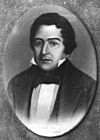 |
Mariano Rivera Paz (1804–1849) |
3 December 1839 | 25 February 1842 | 2 years, 84 days | Conservative | — |
| 2 | 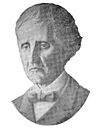 |
José Venancio López (1791–1863) Acting |
25 February 1842 | 14 May 1842 | 78 days | Independent | — |
| 3 |  |
Mariano Rivera Paz (1804–1849) |
14 May 1842 | 14 December 1844 | 2 years, 214 days | Conservative | — |
| 4 | 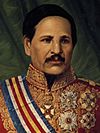 |
Rafael Carrera (1814–1865) |
14 December 1844 | 16 August 1848 | 3 years, 246 days | Conservative | — |
Republic from Carrera to the Liberal Revolution (1847–1871)
| No. | Portrait | Name (Birth–Death) |
Term of office | Political party | Elected | ||
|---|---|---|---|---|---|---|---|
| Took office | Left office | Time in office | |||||
| 4 |  |
Rafael Carrera (1814–1865) |
14 December 1844 | 16 August 1848 | 3 years, 246 days | Conservative | — |
| 5 | 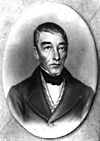 |
Juan Antonio Martínez (?–1854) Acting |
16 August 1848 | 28 November 1848 | 104 days | Conservative | — |
| 6 |  |
José Bernardo Escobar (1797–1849) Acting |
28 November 1848 | 1 January 1849 | 34 days | Conservative | — |
| 7 |  |
Mariano Paredes (1800–1856) Acting |
1 January 1849 | 6 November 1851 | 2 years, 309 days | Independent | — |
| 8 |  |
Rafael Carrera (1814–1865) |
6 November 1851 | 14 April 1865 | 13 years, 159 days | Conservative | — |
| 9 | 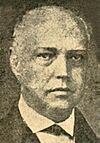 |
Pedro de Aycinena y Piñol (1802–1897) Acting |
14 April 1865 | 24 May 1865 | 40 days | Conservative | — |
| 10 | 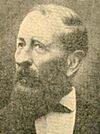 |
Vicente Cerna Sandoval (1815–1885) |
24 May 1865 | 29 June 1871 | 6 years, 36 days | Conservative | — |
Liberal Period (1871–1944)
| No. | Portrait | Name (Birth–Death) |
Term of office | Political party | Elected | ||
|---|---|---|---|---|---|---|---|
| Took office | Left office | Time in office | |||||
| 11 | 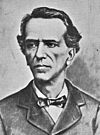 |
Miguel García Granados (1809–1878) |
29 June 1871 | 4 June 1873 | 1 year, 340 days | Liberal | — |
| 12 | 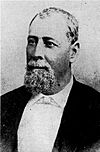 |
Justo Rufino Barrios (1835–1885) |
4 June 1873 | 2 April 1885 | 11 years, 302 days | Liberal | 1873 1880 |
| 13 | 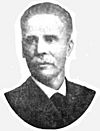 |
Alejandro M. Sinibaldi (1825–1896) Acting |
2 April 1885 | 5 April 1885 | 3 days | Liberal | — |
| 14 | 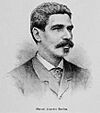 |
Manuel Barillas (1845–1907) |
6 April 1885 | 15 March 1892 | 6 years, 345 days | Liberal | — |
| 15 | 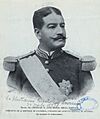 |
José María Reina Barrios (1854–1898) |
15 March 1892 | 8 February 1898 | 5 years, 330 days | Liberal | 1892 |
| 16 |  |
Manuel Estrada Cabrera (1857–1924) |
8 February 1898 | 15 April 1920 | 22 years, 67 days | Liberal | 1898 1904 1910 1916 |
| 17 | 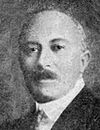 |
Carlos Herrera (1856–1930) |
15 April 1920 | 10 December 1921 | 1 year, 239 days | Unionist Party | 1920 (Apr) 1920 (Aug) |
| 18 | 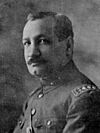 |
José María Orellana (1872–1926) |
10 December 1921 | 26 September 1926 | 4 years, 290 days | Liberal | 1921 1922 |
| 19 | 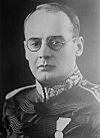 |
Lázaro Chacón González (1873–1931) |
26 September 1926 | 12 December 1930 | 4 years, 77 days | Unionist Party | 1926 |
| — | 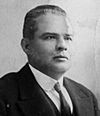 |
Baudilio Palma (1880–1930) Acting |
13 December 1930 | 17 December 1930 | 4 days | Conservative | — |
| — | 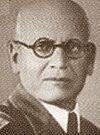 |
Manuel María Orellana Contreras (1870–1940) De facto |
17 December 1930 | 2 January 1931 | 16 days | Liberal | — |
| 20 | 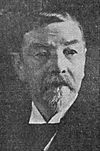 |
José María Reina Andrade (1860–1947) Acting |
2 January 1931 | 14 February 1931 | 43 days | Liberal | — |
| 21 | 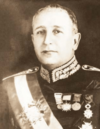 |
Jorge Ubico (1878–1946) |
14 February 1931 | 1 July 1944 | 13 years, 138 days | Progressive Liberal Party | 1931 |
| 22 | 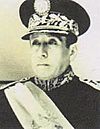 |
Juan Federico Ponce Vaides (1889–1956) Acting |
4 July 1944 | 20 October 1944 | 108 days | Progressive Liberal Party | July 1944 |
The Ten-Year Revolution (1944–1954)
The strict rule of Jorge Ubico, which had lasted since 1931, ended with a revolution on July 4, 1944. After many protests by students and workers, Ubico resigned and went to Mexico. He handed power to his Vice President, Federico Ponce Vaides. Elections were held on July 4, 1944, and Ponce was declared president.
However, the opposition did not accept these results. On October 20, 1944, a group of young military officers overthrew Ponce. They formed a temporary government called the Revolutionary Government Junta. A new constitution was created, and new elections were held. Juan José Arévalo won in 1944, and Jacobo Árbenz won in 1950. During this time, Guatemala made many social and economic changes, including a major land reform.
| No. | Portrait | Name (Birth–Death) |
Term of office | Political party | Elected | ||
|---|---|---|---|---|---|---|---|
| Took office | Left office | Time in office | |||||
| 23 |  |
Revolutionary Government Junta | 20 October 1944 | 15 March 1945 | 146 days | Military | — |
| 24 | 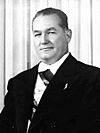 |
Juan José Arévalo (1904–1990) |
15 March 1945 | 15 March 1951 | 6 years | Revolutionary Action Party | 1944 |
| 25 | 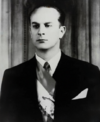 |
Jacobo Árbenz (1913–1971) |
15 March 1951 | 27 June 1954 (Deposed) |
3 years, 104 days | Revolutionary Action Party / Party of the Guatemalan Revolution |
1950 |
Military Governments (1954–1958)
After Jacobo Árbenz resigned, Colonel Carlos Enrique Díaz, head of the Armed Forces, took over as provisional president. Díaz quickly formed a temporary government board with Colonels Elfego H. Monzón and José Ángel Sánchez. On June 29, Díaz was forced to resign, and Monzón became the new head of the board. Monzón then created a new board, including Colonel Castillo Armas.
This new board ended after a public vote on October 10, 1954, which allowed Colonel Castillo Armas to become president. Under Castillo Armas, many changes from the Guatemalan Revolution were stopped. People who opposed the government, as well as unions and farmer groups, were treated harshly. Castillo Armas was assassinated on July 26, 1957. The Congress then appointed Luis Arturo González as acting president. He was told to hold elections within four months.
The election took place on October 20, 1957, but the results were canceled because of claims of cheating. President González resigned and gave power to a temporary governing board led by Óscar Mendoza Azurdia, Gonzalo Yurrita Nova, and Roberto Lorenzana. This new board governed for only two days before Congress appointed Colonel Guillermo Flores Avendaño as acting president. President Avendaño then called for elections in January 1958.
| No. | Portrait | Name (Birth–Death) |
Term of office | Political party | Elected | ||
|---|---|---|---|---|---|---|---|
| Took office | Left office | Time in office | |||||
| 26 | 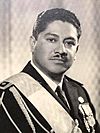 |
Carlos Enrique Díaz de León (1915–2014) Provisional President |
27 June 1954 | 29 June 1954 | 2 days | Military | — |
| 27 |  |
Elfego Hernán Monzón Aguirre (1912–1981) Chairman of Military Junta |
29 June 1954 | 8 July 1954 | 9 days | National Liberation Movement | — |
| 28 | 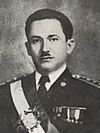 |
Carlos Castillo Armas (1914–1957) |
8 July 1954 | 26 July 1957 | 3 years, 18 days | National Liberation Movement | 1954 |
| 29 | 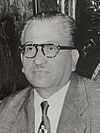 |
Luis Arturo González López (1900–1965) Acting |
27 July 1957 | 24 October 1957 | 89 days | National Liberation Movement | — |
| 30 | 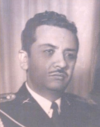 |
Óscar Mendoza Azurdia (1917–1995) Chairman of Military Junta |
24 October 1957 | 26 October 1957 | 2 days | Military | — |
| 31 | 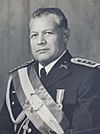 |
Guillermo Flores Avendaño (1894–1982) Acting |
26 October 1957 | 2 March 1958 | 129 days | Military | — |
Civil War Period (1958–1996)
| No. | Portrait | Name (Birth–Death) |
Term of office | Political party | Elected | ||
|---|---|---|---|---|---|---|---|
| Took office | Left office | Time in office | |||||
| 32 | 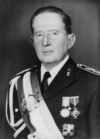 |
Miguel Ydígoras Fuentes (1895–1982) |
2 March 1958 | 31 March 1963 (Deposed) |
5 years, 29 days | Military / REDENCION |
1958 |
| 33 | 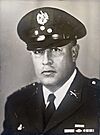 |
Enrique Peralta Azurdia (1908–1997) |
31 March 1963 | 1 July 1966 | 3 years, 92 days | Institutional Democratic Party | — |
| 34 | 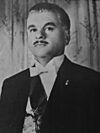 |
Julio César Méndez Montenegro (1915–1996) |
1 July 1966 | 1 July 1970 | 4 years | Revolutionary Party | 1966 |
| 35 | 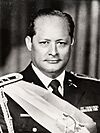 |
Carlos Manuel Arana Osorio (1918–2003) |
1 July 1970 | 1 July 1974 | 4 years | Institutional Democratic Party | 1970 |
| 36 | 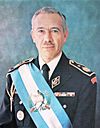 |
Kjell Eugenio Laugerud García (1930–2009) |
1 July 1974 | 1 July 1978 | 4 years | Institutional Democratic Party | 1974 |
| 37 | 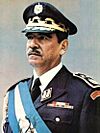 |
Fernando Romeo Lucas García (1924–2006) |
1 July 1978 | 23 March 1982 (Deposed) |
3 years, 265 days | Institutional Democratic Party | 1978 |
| 38 | 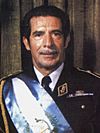 |
Efraín Ríos Montt (1926–2018) |
23 March 1982 | 8 August 1983 (Deposed) |
1 year, 138 days | Military | — |
| 39 | 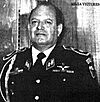 |
Óscar Humberto Mejía Víctores (1930–2016) |
8 August 1983 | 14 January 1986 | 2 years, 159 days | Military | — |
| 40 |  |
Vinicio Cerezo (born 1942) |
14 January 1986 | 14 January 1991 | 5 years | Guatemalan Christian Democracy | 1985 |
| 41 | 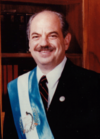 |
Jorge Serrano Elías (born 1945) |
14 January 1991 | 1 June 1993 (Resigned) |
2 years, 138 days | Solidarity Action Movement | 1990 |
| 42 | 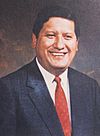 |
Gustavo Adolfo Espina Salguero (1946–2024) Acting |
1 June 1993 | 5 June 1993 | 4 days | Solidarity Action Movement | — |
| 43 | 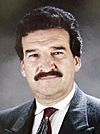 |
Ramiro de León Carpio (1942–2002) |
6 June 1993 | 14 January 1996 | 2 years, 222 days | Independent | 1993 |
Modern Era (1996–Present)
| No. | Portrait | Name (Birth–Death) |
Term of office | Political party | Elected | ||
|---|---|---|---|---|---|---|---|
| Took office | Left office | Time in office | |||||
| 44 | 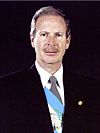 |
Álvaro Arzú (1946–2018) |
14 January 1996 | 14 January 2000 | 4 years | National Advancement Party / Unionist Party |
1995–1996 |
| 45 | 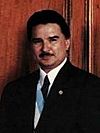 |
Alfonso Portillo (born 1951) |
14 January 2000 | 14 January 2004 | 4 years | Guatemalan Republican Front | 1999 |
| 46 | 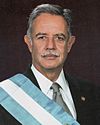 |
Óscar Berger (born 1946) |
14 January 2004 | 14 January 2008 | 4 years | National Solidarity Party / Grand National Alliance |
2003 |
| 47 | 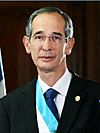 |
Álvaro Colom (1951–2023) |
14 January 2008 | 14 January 2012 | 4 years | National Unity of Hope | 2007 |
| 48 | 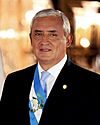 |
Otto Pérez Molina (born 1950) |
14 January 2012 | 3 September 2015 (Resigned) |
3 years, 232 days | Patriotic Party / Grand National Alliance |
2011 |
| 49 | 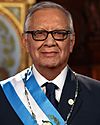 |
Alejandro Maldonado (born 1936) Acting |
3 September 2015 | 14 January 2016 | 133 days | Independent | — |
| 50 | 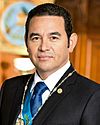 |
Jimmy Morales (born 1969) |
14 January 2016 | 14 January 2020 | 4 years | National Convergence Front | 2015 |
| 51 | 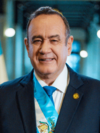 |
Alejandro Giammattei (born 1956) |
14 January 2020 | 14 January 2024 | 4 years | Vamos | 2019 |
| 52 | 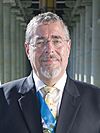 |
Bernardo Arévalo (born 1958) |
14 January 2024 | Incumbent (Term ends on 14 January 2028) |
2 years, 35 days | Semilla | 2023 |
Timeline of Presidents
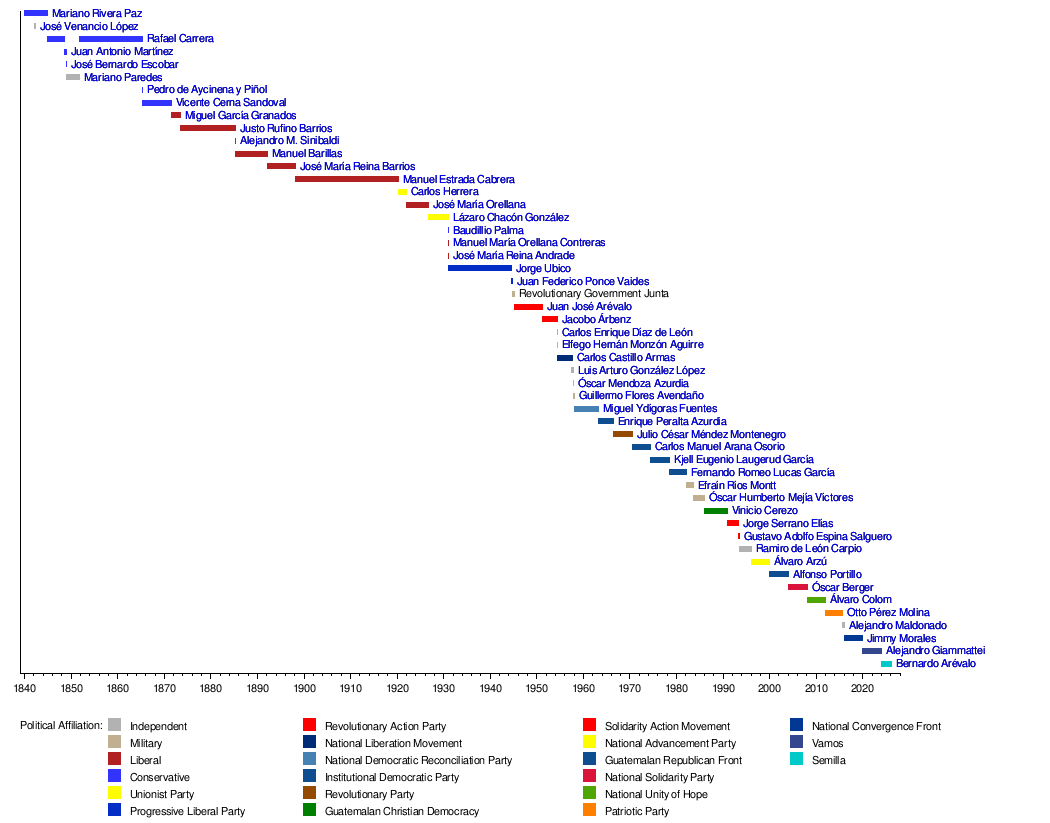
Latest Election Results
The most recent presidential election in Guatemala was held in 2023. Bernardo Arévalo won the election and became the current President.
| Candidate | Running mate | Party | First round | Second round | |||
|---|---|---|---|---|---|---|---|
| Votes | % | Votes | % | ||||
| Sandra Torres | Romeo Guerra | National Unity of Hope | 881,592 | 20.98 | 1,567,664 | 39.09 | |
| Bernardo Arévalo | Karin Herrera | Semilla | 654,534 | 15.58 | 2,442,718 | 60.91 | |
| Manuel Conde | Luis Antonio Suárez | Vamos | 435,631 | 10.37 | |||
| Armando Castillo | Édgar Grisolia | Vision with Values | 404,059 | 9.61 | |||
| Edmond Mulet | Máximo Santa Cruz | Cabal | 371,857 | 8.85 | |||
| Zury Ríos | Héctor Cifuentes | Valor–Unionist | 365,028 | 8.69 | |||
| Manuel Villacorta | Jorge Mario García | Will, Opportunity and Solidarity | 238,686 | 5.68 | |||
| Giovanni Reyes | Óscar Figueroa | Bienestar Nacional | 141,714 | 3.37 | |||
| Amílcar Rivera | Fernando Mazariegos | Victory | 135,591 | 3.23 | |||
| Amílcar Pop | Mónica Enríquez | Winaq–URNG–MAIZ | 87,676 | 2.09 | |||
| Ricardo Sagastume | Guillermo González | Todos | 76,582 | 1.82 | |||
| Rudy Guzmán | Diego González | Nosotros | 66,116 | 1.57 | |||
| Isaac Farchi | Mauricio Zaldaña | Blue Party | 61,472 | 1.46 | |||
| Julio Rivera | José Urrutia | My Family | 46,092 | 1.10 | |||
| Francisco Arredondo | Francisco Bermúdez | Commitment, Renewal and Order | 41,948 | 1.00 | |||
| Giulio Talamonti | Óscar Barrientos | Republican Union | 40,358 | 0.96 | |||
| Hugo Peña | Hugo Johnson | Elephant Community | 39,271 | 0.93 | |||
| Rudio Lecsan Mérida | Rubén Darío Rosales | Humanist Party | 34,285 | 0.82 | |||
| Rafael Espada | Arturo Herrador | Republican Party | 32,139 | 0.76 | |||
| Sammy Morales | Miguel Ángel Moir | National Convergence Front | 22,316 | 0.53 | |||
| Álvaro Trujillo | Miguel Ángel Ibarra | Change | 17,715 | 0.42 | |||
| Luis Lam Padilla | Otto Marroquín | National Integration Party | 7,780 | 0.19 | |||
| Total | 4,202,442 | 100.00 | 4,010,382 | 100.00 | |||
| Valid votes | 4,202,442 | 75.62 | 4,010,382 | 95.25 | |||
| Invalid votes | 966,389 | 17.39 | 147,165 | 3.50 | |||
| Blank votes | 388,442 | 6.99 | 52,687 | 1.25 | |||
| Total votes | 5,557,273 | 100.00 | 4,210,234 | 100.00 | |||
| Registered voters/turnout | 9,249,794 | 60.08 | 9,361,068 | 44.98 | |||
| Source: TSE (first round; 99.13% counted) TSE (second round; 100% counted) | |||||||
Images for kids
Casa Presidencial de Guatemala
See also
 In Spanish: Presidente de Guatemala para niños
In Spanish: Presidente de Guatemala para niños
 | Sharif Bey |
 | Hale Woodruff |
 | Richmond Barthé |
 | Purvis Young |


